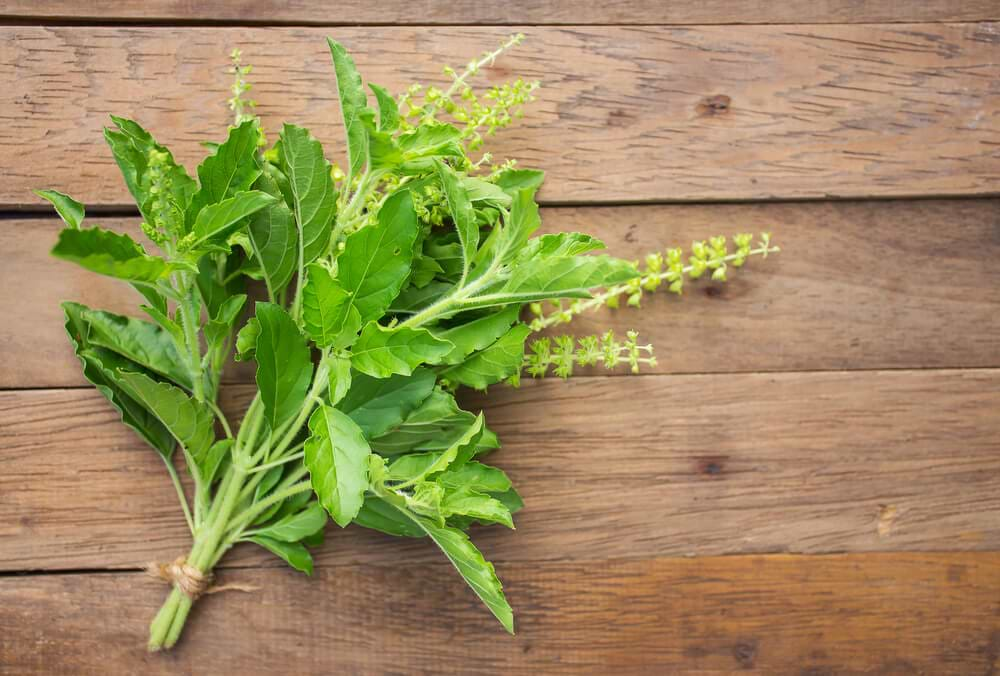This month WishGarden has chosen Tulsi (Holy Basil) as the Herb of the Month. We've planned a month full of fun and engaging content in partnership with Organic India. Organic India is truly an expert when it comes to Tulsi and they are the perfect partner to highlight this incredible herb.
Regenerative, Organic & Fair Trade Tulsi
Organic India's commitment to empowering small family farmers in India to cultivate regenerative, organic Tulsi is impressive and WishGarden fully embraces their mission. Organic India has proved that agriculture can restore and protect the natural environment. Food and plant farming work so harmoniously with nature that depleted soil is enlivened, insect pollinators return, water resources are replenished, and each crop cycle strengthens nature's balance.
Organic India's bio-regenerative agriculture program includes soil fertility management with composting and crop rotation, planting and harvesting with lunar cycles as per ancient wisdom, seed collection, water management, and biodiversity.
Beginning with a single farmer in 1999 and one sacred herb, Tulsi, or Holy Basil, the Organic India farmer partner community has grown to 3,000-plus farm families throughout India cultivating tens of thousands of acres of regenerative organic farmland. All have embraced organic, bio-regenerative agriculture and have enjoyed social, environmental, and economic recovery as a result.
A Deeper Connection With Tulsi
Plant profiles, such as this, are intended to help you cultivate a deeper relationship with the herbs that you consume. Reading about Tulsi's rich history can help weave a tapestry of images and anecdotes to call upon each time you sip some Tulsi tea or take a Holy Basil supplement. Learning about the herbs you're taking helps to bring deeper meaning and understanding to your experience with these plants, and helps you to fully internalize the plant's benefits on all levels.
To make your learning experience even more profound, grab a cup of Tulsi tea to sip while reading to give you the full experience of the taste and aroma of the plant as you learn. I find the scent of Tulsi to be intoxicating, never failing to bring a smile to my face and a lift in my step every time I inhale its aroma and sip the inviting infusion. Having a full sensory experience of an herb while learning about it will help you to make a powerful and memorable connection with the plant.
You can make a simple cup of Tulsi tea by steeping a tablespoon of the dried leaves in 8 oz of boiling water for 10 minutes. Or you can grab one of the incredible Tulsi tea blends offered by Organic India. They're all fantastic, but especially of note are the Tulsi Hibiscus and the Tulsi Sweet Rose blends.
Go ahead. Grab that cup of tea, and read on!
History & Herblore
Tulsi (Ocimum sanctum) is native to India and has been used in Ayurvedic Medicine for at least 5,000 years. In the Ayurvedic tradition, Holy Basil is referred to as a Rasayana herb, an herb that "nourishes a person's growth to perfect health and promotes long life." In the Hindu tradition, every part of the Tulsi plant is considered sacred. Most households in India have a Tulsi plant, typically placed in the center of the central courtyard of the home. The Tulsi plant serves a spiritual purpose as well as functional. The Tulsi plant is the focus of various rituals throughout the day while also serving as a natural insect repellant in the home. It's also believed to bring good luck when planted in or near the home.
Tulsi is believed to be sacred to the goddess Lakshmi, and in India they refer to Tulsi as "The Queen of Herbs." Tulsi means "incomparable one" or "matchless" in Sanskrit and is used in religious ceremonies to help souls make their way to heaven. A tea of the leaves is often given to one who is dying to help guide their way.
The Tulsi plant is believed to be the earthly incarnation of the Divine Mother, Tulasi. It's believed that it earned its other common name, Holy Basil, because it is often planted around temples and courtyards in India. It's common in Hindu and Greek Orthodox practices for holy water to be made with Tulsi leaves. The wood of the Tulsi plant is used to make beads for prayer malas.
Botany & Harvesting
Tulsi is an annual plant belonging to the mint family with square stem, opposite leaves and irregular white, pink or purple flowers. The leaves are harvested just before the plant flowers, usually in early summer. In India, there are strict rules around harvesting Tulsi and the harvest must begin by asking forgiveness from the plant.
Organic India treats herbs as living beings; handpicking and carefully drying Tulsi preserves the maximum amount of beneficial constituents. The Vedic tradition speaks of the Prana, or life force of whole herbs, as a powerful tool for wellness. Organic India believes in whole herb wisdom, respecting the intelligence of nature, and keeping herbal formulas as close to their original form as possible.
Varieties Of Holy Basil
The benefits of Tulsi positively impact the whole human entity, including the spirit, and the breadth of its healing capacity is truly remarkable. There are more than a hundred varieties of the plant, but among them a few stand out above the rest.
Rama Tulsi (also known as Green Leaf Tulsi), a broader Holy Basil leaf variety, is found in parts of China, Nepal, India, and southern South America. It promotes healthy digestion, and though its flavor tends toward the mild, its scent becomes stronger when its leaves are crushed. Krishna Tulsi is characterized by its purple leaf and grows in areas throughout India, but remains harder to find than the greener variety.
Krishna Tulsi (also known as Shyama Tulsi or Purple Leaf Tulsi) has gained a reputation for supporting respiratory and ear health, and promoting healthy skin. This slow-growing plant features a spicy, pungent flavor and odor with a less bitter taste.
Lastly, there is Vana Tulsi, also known as Wild Forest Holy Basil, and Wild Leaf Tulsi. This variety is the most difficult to find, as it grows around the foothills of the Himalayas. Vana Tulsi is considered the tastiest and most beneficial of the Tulsi herb family, and it features light green upper leaves and dark green lower leaves.
Historical & Modern Uses
Traditionally the powdered Tulsi root was infused in ghee and taken as a nourishing food. To increase energy and improve digestive function, the seeds were mixed in water, juice or milk. For centuries, the dried leaves were stored with grain to repel insects. The flower essence of Tulsi is said to bring clarity to one's soul's purpose and focus to one's true path.
Many studies have been done to evaluate Tulsi's benefits, and several of these have been performed in India. A few of the studies have demonstrated Tulsi's ability to support healthy cognitive function, including improved memory, focus and mental clarity. Other studies have reported results indicating Tulsi's ability to encourage healthy microbial balance both internally and externally, its ability to balance blood sugar and its ability to assist the body in managing a healthy response to stress.
Among the well-researched (and beneficial) constituents of Tulsi are eugenol (a volatile oil), ursolic acid (a triterpenoid), and rosemarinic acid (a phenylpropanoid). Other active compounds include caryophyllene and oleanolic acid, carotenoids, vitamin C, calcium, iron, zinc, and chlorophyll.
Today, Tulsi can be found in many forms, including liquid extracts, capsules and tea blends. It's most widely known for its ability to support a healthy response to stress. WishGarden uses organic Tulsi in our Deep Stress Adrenal Rescue with Ashwagandha formula to help lessen the negative effects of stress on the body. Organic India offers a wide variety of the highest quality Tulsi supplements, including capsules and several tea blends.
Holy Basil Benefits
Adaptogenic Tonic To Support The Heart & A Healthy Stress Response
Tulsi has a long history of use as a tonic herb that invigorates the body and mind, and encourages increased vitality. Today it is considered an important adaptogenic herb that supports the body in adapting to stress and uplifts the mood by nourishing the nervous system. What's fascinating about Tulsi is that it not only helps to protect the body from the effects of mental and physiological stress, but also from external stressors such as environmental toxins, heavy metals and radiation.
Holy Basil also has an affinity for the heart. It supports healthy blood pressure, healthy cholesterol levels, healthy circulatory function and balanced stress-related hypertension.
Immune, Respiratory & Blood Sugar Support
Tulsi supports immune function through its ability to promote healthy inflammatory response and by encouraging the body's natural detoxification process. Studies have shown that Tulsi is high in antioxidants and supports healthy cellular function, both of which further support immunity.
Due to the plant's high amount of volatile oils, it has a special affinity for supporting healthy inflammatory response in the lungs. This makes it an especially important herb to have on hand to encourage respiratory health.
Long-term stress can lead to issues with balancing blood sugar. Due to Tulsi's ability to help the body manage the physiological stress response, Tulsi can in turn help to encourage healthy blood sugar regulation.
Topical Uses
While using Tulsi in religious ceremonies and as a tea are ancient practices, equally as important are its age-old topical applications. Read Organic India's blog on Topical Tulsi for Beautiful Skin to learn more. Tulsi can be used as a mouthwash to encourage a healthy microbial balance. A succus or juice of the leaves is used for stings and skin conditions. The infusion is also a nice addition to an after-sun spray.
References
- ORGANIC INDIA
- Tulsi - Ocimum sanctum
- 7 Ways To Use Tulsi Everyday
- Creating A Local Materia Medica: Holy Basil
- Ocimum tenuiflorum
- Tulsi - Ocimum sanctum: A herb for all reasons
- 18 Types of Basil (Tulsi) – The herb is loved all over the World!
- Encyclopedia of Herbal Medicine by Andrew Chevallier
- The Organic Medicinal Herb Farmer by Jeff Carpenter and Melanie Carpenter
Boulder-based businesses WishGarden Herbs and Organic India partnered to bring this post to fruition.
Co-author Amy Malek, CCN, CCH, INHC is a Certified Clinical Nutritionist, Certified Clinical Herbalist, Integrative Nutrition Health Coach and Flower Essence Practitioner. She discovered her love for plants in the Sonoran Desert while living in Tucson, AZ. She has been studying plants of the Mountain West and Southwest for 10 years. Her many teachers include Paul Bergner, Rosemary Gladstar, Dr. Aviva Romm, Lisa Ganora, Kat MacKinnon, Erin Smith, John Slattery and Charles Kane. Her career is divided between Holistic Health, Graphic/Web Design and Marketing/Social Media Consulting. She is currently WishGarden's Social Media Coordinator. She lives in Boulder County, CO. She enjoys wildcrafting and growing her own medicinal plants and making a variety of herbal remedies. You can learn more about her practice on her website, www.wholeheart-wellness.com.
With a mission to be a trusted and innovative global leader in providing organic products and true wellness solutions to a community dedicated to healthy conscious living, ORGANIC INDIA offers a full line of teas and whole-herb supplements that are USDA Certified Organic, Non-GMO Project Verified and certified Kosher. ORGANIC INDIA goes above and beyond sustainable — regenerating environmental, community and business ecosystems. All ORGANIC INDIA products are ethically sourced and sustainably cultivated by 3,000 small family farm partners in India. ORGANIC INDIA, a certified B Corp, was named a 2019 "Best for the World Overall" Honoree.
For more information, please visit www.organicindiausa.com.
For educational purposes only. This information has not been evaluated by the Food and Drug Administration. This information is not intended to diagnose, treat, cure, or prevent any disease, or sell any product.
Recommended Products
Further Reading













